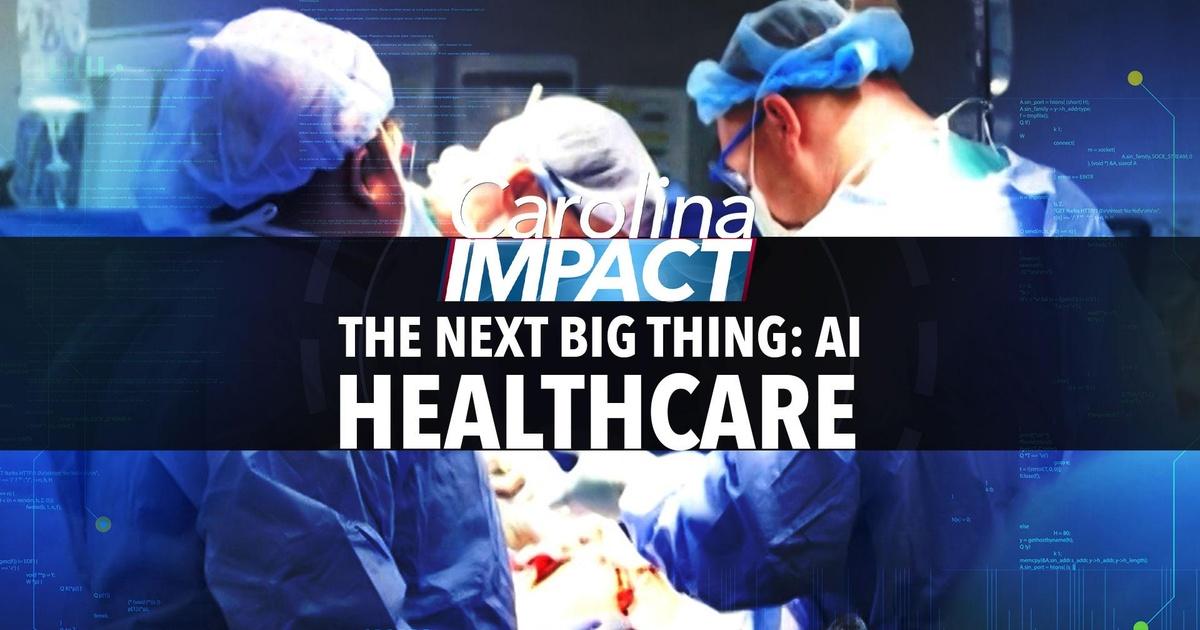
Carolina impact | how artificial intelligence is helping in the medical field | season 10 | episode 27
- Select a language for the TTS:
- UK English Female
- UK English Male
- US English Female
- US English Male
- Australian Female
- Australian Male
- Language selected: (auto detect) - EN
Play all audios:

- [Rochelle] Artificial intelligence is increasingly being used in hospitals to provide more efficient and effective patient care. - Surgery. This patient, no question is benefited from ai.
- [Rochelle] Doctors at Atrium Health in Charlotte are using cutting edge AI research to create the next generation of healthcare technology. - Artificial intelligence is here, it's
coming. Don't hide from it. We have to embrace it. - Dr. Todd Heniford, chief of gastrointestinal and minimally invasive surgery and his team developed two award-winning smartphone apps
that predict surgical complications for hernia repair patients. - The first app that we did, we had 1700 patients and over 2 million data points. Once you get that much information, you can
start to predict outcomes and all it is is a complex mathematical equation. And so our first app was about quality of life after hernia repair. - [Rochelle] According to Heniford, the
world's first artificial intelligence tool for predicting hernia surgery outcomes provides greater accuracy and insight, so doctors can make better decisions. - What they demonstrated
is they could take preoperative CAT scans that we had previously done a mathematical equation on, and do dramatically better, and helping us take care of patients and predict outcomes in
patients prior to surgery. - [Rochelle] Team members, doctors Sharbel Elhage and Sullivan Ayuso say the new AI model is machine learning that builds on 1000 of CAT scans, years of research
and patient data. Dr. Elhage explains how it works. - We structure the algorithm to take a look at these images and teach itself, so it gets a set of images, a big set of images where it
knows what the outcome is, what the yes/no outcome is for whatever variable we're looking at. And then it goes through those images 1000 of times, and just keeps going through until it
thinks, okay, I've got it. I can now find nuanced pixel changes in these images that allow me to differentiate a positive outcome versus a negative outcome. - The AI associated
marketplace is growing rapidly, thanks to medical institutions like Atrium Health, developing the next generation of AI power tools. A 2020 publication in the National Institutes of Health
estimates that AI applications could cut annual US healthcare costs by $150 billion by 2026. Hernia specialists at Atrium Health say a majority of hernia cases requires straightforward
operations, but 20 to 30% of patients develop complications that might have been prevented. - Why are we focusing on this so much? It's because wound complications put you at risk for
developing a recurrence of a hernia, right? We don't want to have people in a pipeline where they keep getting operation after re-operation. - [Rochelle] A devastating situation patient
Scott Gilpin knows all too well. - It's very difficult and there isn't one day that goes by that I don't cry. - [Rochelle] It's been an emotional journey for Gilpin who
lives in Florida. A routine surgery to repair an abdominal hernia turned into a series of failed surgeries. For nearly a year, Gilpin battled sepsis, blood clots, and numerous complications.
- Having to teach myself how to walk-- (voice breaking) How to walk again. And then you have to carry a bag around with bandages, a change of clothes because, wear an colostomy bag, because
you never knew when this bag was gonna break or was gonna start leaking. - [Rochelle] Eventually Gilpin traveled to Charlotte for treatment at Carolina's Hernia Center. Dr. Heniford
and his team used predictive technology to draft a game plan. Then they operated, and soon Gilpin was on the road to recovery. - No one should have to go through what I went through. And if
you take the skill of him and his team, together with this artificial intelligence, I mean, it can only help more people, save more people. - [Rochelle] Though Gilpin surgery was corrective,
Heniford says complex cases like his are best treated in specialty clinics that have highly trained surgeons and the resources to handle problems. While doctors can make educated guesses as
to who those patients will be, machine learning provide certainty. - What a surgeon in a smaller community can do is put that patient's CAT scan into this AI project, and say, well,
this patient has a significant chance of developing pulmonary failure. That patient needs to go to a tertiary center. - [Rochelle] The AI model has shown positive results with atrium
patients. The hospital is about to start a prospective trial, in addition to testing patients outside Atrium's system. - Something we're trying to avoid, which is pushing things
out too early. So, I think we're trying to be responsible about making sure our algorithm is functional in various patient populations. - [Rochelle] Artificial intelligence has the
potential to revolutionize the way healthcare is delivered. Dr. Ayuso says it's fitting as patients themselves become more savvy. - Everything's really at the tip of these patients
hands. And so people come into the clinic and they're asking much more cerebral questions than they have in the past. And I think that this sort of technology actually, you know, will
appease a lot of people. - [Rochelle] But most importantly, it will give people a new chance at life. For "Carolina Impact," I'm Rochelle Metzger.
